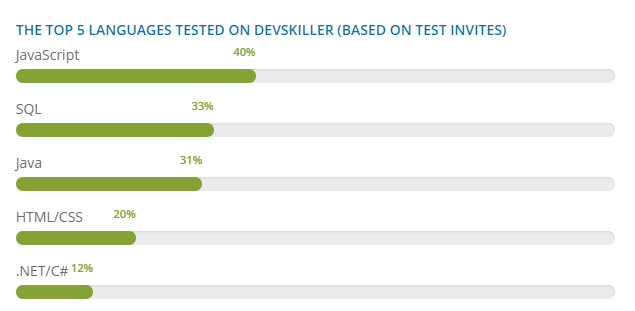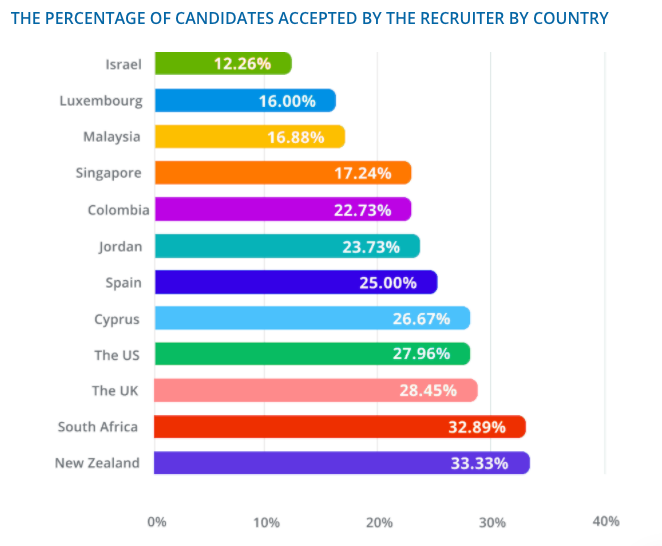Data plays a huge role in the development of your business.
Regardless of what products you develop or what services you sell, data can’t be ignored. For its data that tells us what’s happening in the industry in which you operate.
So to kick off 2020, DevSkiller took a step back and looked at all the raw, unprocessed data they’d gathered from their coding test platform.
And there was a load of data to crunch.
After cleaning the data and extrapolating trends, the DevSkiller team was able to take a look at the state of not only the tech recruitment industry but also the technical coding industry as a whole.
Demands of certain languages, geographical preferences, market supply, and demand are just a few things that were uncovered. Even though we’ve seen a change in work trends, the demand for skilled developers is ever-present.
In this article, you’ll read a select few of those findings, but the entire report can be found in the DevSkiller top IT skills report 2020.
JavaScript is the most in-demand IT skill of 2020
JavaScript, quite unsurprisingly, is the most used front-end language, being used in 40% of tests. This is up from 38% last year, and not surprising given that Stack Overflow’s 2019 developer survey found to be JavaScript the most popular language amongst professional developers. 
After JavaScript is SQL, Java, HTML with CSS, and .NET/C# are the 5 most popular IT skills of 2020.
These skills had a much higher percentage last year, showing that fewer companies are looking for developers with highly-specific skills. Developers with a wide range of skills are more versatile, leading to a higher demand for developers with a wider skill set.
ASP.NET is the most popular .NET/C# resource, used in 55% of tests
ASP.NET is a popular web app framework, and its position goes to show how important web development is to a .NET/C# tech stack. MVC architecture is used in 42% of tests and Entity Framework in 28%. Interesting, .NET Core which is NET’s open-source portable version, is growing in popularity. Number 5 in the .NET/C# Technology stack is taken up by SQL Server, .NET’s server technology.
Interesting, .NET Core which is NET’s open-source portable version, is growing in popularity. Number 5 in the .NET/C# Technology stack is taken up by SQL Server, .NET’s server technology.
CSS and HTML are together in 63% of the time
CSS and HTML continue to be tested side by side this year.
What does this say?
HTML can only be truly useful if it’s used alongside other skills and languages, making it commonly tested amongst other languages, both front and back-end. Something to keep in mind if you’re trying to improve your employment opportunities.
Following HTML, WCAG 2.0 is used in about 25% of all CSS tests.
React, Spring, ASP.NET, MySQL, HTML, Data Analysis with Python, and Laravel are the most popular technologies in their respective tech stacks
The DevSkiller platform uses RealLifeTestingTM to create mock situations that a coder will face on the job. These types of tests are important not only in assessing developers’ problem-solving skills but also their abilities with the language.
Thanks to this, we saw the following:
- JavaScript tech stacks feature React 32% of the time and ES6 26%
- 46% of JavaScript stack tests have feature Spring
- ASP.NET makes an appearance in 46% of .NET tests, which is to be expected
- MySQL appears in 27% of SQL tests, and MSSQL in 35% of SQL tests
- HTML makes an appearance in 63% of CSS tests but was tested separately much more often
- 29% of Python stack tests feature Data Analysis with Python and Django in 21% of tests
In PHP stacks, Laravel appeared in 28% of tests and Doctrine in 12%
Italian companies have the highest scoring candidates
Italian companies that have the highest-scoring applicants.
This finding confirms the fact that recruiters are giving more accurate and relevant coding tests.
Kenyan companies have the next highest scoring candidates (55.7%), followed by Australia (30.6%) and The Philippines (30.5%).
Israel is the most selective country
As a result of coding tests being more specific for the role, we see that companies are also getting more selective.
Israeli companies are considering only 12.26% of candidates for the role.
In fact, Israel, Luxembourg, Malaysia, and Singapore are all more selective than the most selective country (Singapore) of last year at 20%.
 What this information shows is that tests are targeted to more appropriately skilled candidates. Wider talent pools have allowed recruiters to laser-focus their desired skills, and therefore test accordingly.
What this information shows is that tests are targeted to more appropriately skilled candidates. Wider talent pools have allowed recruiters to laser-focus their desired skills, and therefore test accordingly.
In summary
The changes from last year’s report to this year aren’t huge – there are no new players that are shaking up the industry. But what we are seeing is a change in the prioritization of certain skills and abilities.
Staying aware and informed of these changes can help keep you as an individual, and your business competitive and progressive.
Find more leanings from the vast amount of data in the DevSkiller top IT skills report 2020.
Author: Tom Winter
Tom Winter is the CRO at DevSkiller, a developer screening & online interviews in one platform powered by RealLifeTesting™. Madly in love with everything tech, Tom specializes in streamlining the hiring process of tech talent and data-driven recruitment. He’s also an avid conference speaker.
Follow Us